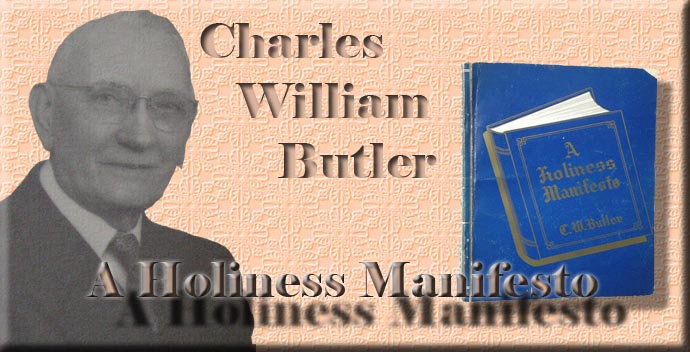
A Holiness Manifesto
By Charles William Butler
Chapter 17
A Single StandardThere is but one standard of life for all Christians. In teaching the Bible truth of two works of grace in salvation, we do not teach a double standard of life. Holiness as a heart-attitude toward all known sin begins in the experience of genuine repentance. Holiness as the standard of life so far as conduct or our outward living is concerned begins with regeneration. God does not justify sinning in any measure or degree. God's justification is holy. Before the faith by which we are justified can be experienced, we must in our repentance satisfy a holy God. No sinning habit, or sin as allowed for by us is compatible with our enjoying the smile and favor of a holy God. "He that is born of God, doth not commit sin;" that is, does not live in the practice of sin. The verb commit denotes continued action, it therefore means, does not live in the habit of sinning. If one whose habit it is not to sin should in any single instance be betrayed into any sin, even this is not to be overlooked nor passed by, but he is to seek an immediate recovery from such failure by the use of Christ as our advocate. "These things write I unto you that ye sin not" and if any man sin, that is, if any man whose habit it is not to sin, should by any means fail, "We have an advocate with the Father Jesus Christ the righteous." Our use of the Advocate is essential to keep us in a clearly justified condition and relation before God. In other words, no allowance is made for any other than a life of obedience to God, or of righteousness of life, or in holiness as the sustained standard of our outward living. The definite experience of "true holiness" as a second work of grace does not raise the standard of our outward living to a higher level, but it removes inward sinfulness, empowers inward weakness and conditions the believer with the advantage of inward purity and power to live the standard of outward holiness without the inward struggle of civil war, and the lack of moral strength, which spiritual health supplies. We are under a standard as followers of Christ to live a life, which requires spiritual health to live. It is hard for a sick man to be well, but it is not hard for a well man to be well. Thus the prayer of Wesley, "The seed of sin's disease, spirit of health remove, The first work of grace gives life, the second work of grace brings health. When a young preacher, as a candidate for entrance into my conference, I passed an examination on the Methodist Discipline upon which the examiner gave me one hundred. Notwithstanding the success of this examination, I found out a few years later that I had utterly missed one very important paragraph in the Discipline, namely, "Methodist preachers are to insist upon holiness in all of its branches both inward and outward." I always believed in the outward branch of holiness of life, but I was for years utterly blinded as to the inward branch of holiness, that is, the definite inwrought experience which is received by faith, and is given in an instant by the wonderful initial work of the Holy Spirit in Christ's baptism. In outward holiness, we seek to obey the will and word of God up to the measure of light which we possess. In the experience of inwrought holiness, we are cleansed from inward sinfulness and renewed in righteousness, after the image of him that created us. There is an imparted gift of righteousness in this second experience, (Romans 5:17). The moral fiber of our inner life is saved from the infection of original sin and new moral fiber is built into our human selfhood. Both of these epochs of grace are parts of one full salvation. Each part is perfect as a part of the whole. The same atoning sacrifice which makes possible our forgiveness and reconciliation with God, provides for our cleansing and renewing in our inner nature in the "righteousness and true holiness" of God. There is therefore one all-sufficient perfect offering for sin in the sacrifice of Christ, and there is one standard of life for all who follow him, but there are two acts of appropriating faith in him and two definite operations of the Holy Spirit in response to our faith to meet two very definite realms of need in our lives, each an essential part of that salvation which saves from sin here, and fits for final glory hereafter. "Be of sin the double cure, Save from wrath and make me pure." The first essential to our obtaining the blessing is, "belief of the truth" and the final step is a humble and immediate dependence upon the blood for the experience. There is in connection with these conditions of faith, an abandonment to the perfect will of God for every interest of our all to him, at which point faith is enabled to act for the obtaining of the grace. Dear reader, if you are not now in possession of this definite sanctifying grace, do not delay. Give it your first and continued attention until your quest is honored by a blessed realization. Holiness is the standard by which God created man. Holiness is the standard of recovery provided for man in redemption, and holiness is the standard by which God will finally judge all men. |
|
 |
 |
|
|
|
-
Site Navigation
 Home
Home What's New
What's New Bible
Bible Photos
Photos Hiking
Hiking E-Books
E-Books Genealogy
Genealogy Profile
Free Plug-ins You May Need
Profile
Free Plug-ins You May Need
 Get Java
Get Java.png) Get Flash
Get Flash Get 7-Zip
Get 7-Zip Get Acrobat Reader
Get Acrobat Reader Get TheWORD
Get TheWORD